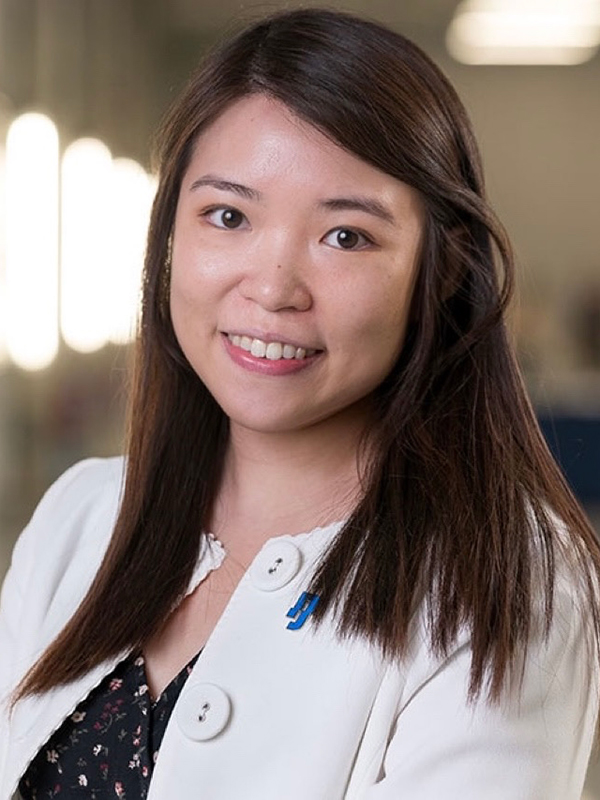- Y7415, Yellow Zone, 7/F, Yeung Kin Man Academic Building
- +852 3442-5494
- +852 3442-0128
- christy.hung@cityu.edu.hk
- CityU Scholars
- Lab Website
Prof. Christy Hung earned her PhD in neuroscience from the University of Cambridge after completing her undergraduate studies in Biochemistry at the University of Hong Kong. She joined University College London in 2019 after receiving a Race Against Dementia Fellowship and subsequently established her independent research laboratory with the support of an Alzheimer’s Research UK Senior Fellowship.
In 2024, Prof. Hung joined the Department of Neuroscience as an associate professor under the Presidential Assistant Professors Scheme. Her research focuses on diseases of the nervous system, particularly Alzheimer’s disease and related dementias. She aims to translate her findings into better diagnostics and new therapeutic targets. Beyond her research, Prof. Hung is passionate about public engagement and promoting inclusivity and diversity in science.
Research Interests
My research group studies diseases of the nervous system, focusing on Alzheimer’s disease and related dementias. We use a multidisciplinary approach, including patient-derived human stem cell models, CRISPR/Cas9 genome editing and advanced imaging techniques, to investigate the molecular mechanisms of Alzheimer's disease and related dementias, with the ultimate aim of translating our insights into better diagnostics and new therapeutic targets.
Our main areas of study are:
- Developing RNA therapeutics for Alzheimer’s disease and related dementias;
- Phenotypic drug screening using high-content imaging in human stem cell models of Alzheimer’s disease;
- Understanding the role of lysosomal dysfunction in neurodegenerative diseases and its potential as a therapeutic target.
Publications
- Srishruthi, Thirumalai, Patani, Rickie, and Hung, Christy*. “Therapeutic potential of APP antisense oligonucleotides for Alzheimer’s disease and Down syndrome-related Alzheimer’s disease.” Molecular Neurodegeneration (2024) 19.1: 57. (DOI:10.1186/s13024-024-00745-5)
- Hung, Christy*, Fertan, Emre, Livesey, Frederick, Klenerman, David, and Patani, Rickie. “APP antisense oligonucleotides reduce Abeta aggregation and rescue endolysosome-autophagy dysfunction in Alzheimer’s disease models.” Brain (2024). (DOI: 10.1093/brain/awae092)
- Hung, Christy* and Patani, Rickie* “4R tau drives endolysosomal and autophagy dysfunction in frontotemporal dementia.” Autophagy (2024). (DOI:10.1080/15548627.2023.2300917)
- Hung, Christy* and Patani, Rickie* “Elevated 4R tau contributes to endolysosomal dysfunction and neurodegeneration in VCP-related frontotemporal dementia.” Brain (2023). (DOI:10.1093/brain/awad370)
- Hung, Christy* and Livesey, Frederick J. “Endolysosome and autophagy dysfunction in Alzheimer disease.” Autophagy (2021): 1-2. (DOI:10.1080/15548627.2021.1963630)
- Hung, Christy, Tuck, Eleanor, Stubbs, Victoria, Scheltens, Philip, Hardy, John, Holstege, Henne and Livesey, Frederick J. “SORL1 deficiency in human excitatory neurons causes APP-dependent defects in the endolysosome-autophagy network.” Cell Reports 35.11 (2021): 109259. (DOI:10.1016/j.celrep.2021.109259)
- Hung, Christy, and Livesey, Frederick J. “Altered gamma-secretase processing of APP disrupts lysosome and autophagosome function in monogenic Alzheimer’s disease.” Cell Reports 25.13 (2018): 3647-3660. (DOI:10.1016/j.celrep.2018.11.095)
- Hung, Christy* “Importance of retrograde axonal transport in mitochondrial health and distribution” Cell Death Discovery 7.1 (2021): 1-2. (DOI: 10.1038/s41420-021-00502-3)
- Hung, Christy* “Live-Cell Imaging Reveals Tau Isoforms Imbalance Disrupts Traffic of APP Vesicles in Human Neurons” The Journal of Neuroscience 37.8 (2017): 1968. (DOI: 10.1523/JNEUROSCI.3688-16.2017)
- Hung, Christy and Coleman, Michael P. “KIF1A mediates axonal transport of BACE1 and identification of independently moving cargoes in living SCG neurons” Traffic 17.11 (2016): 1155-1167. (DOI: 10.1111/TRA.124 28)
18 February 2025
